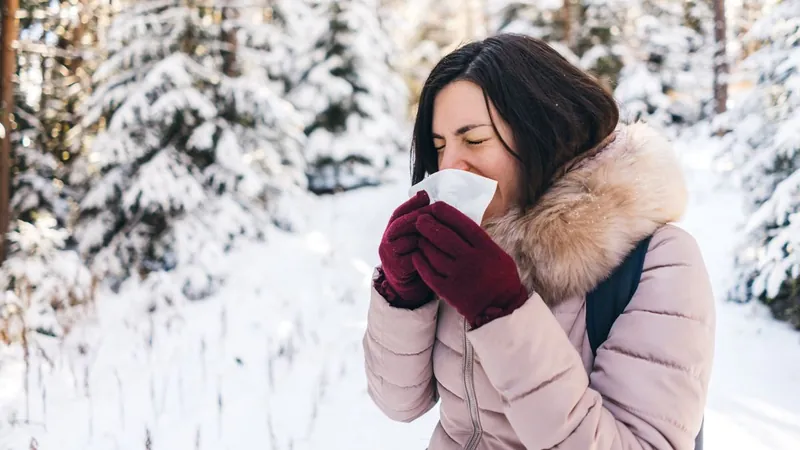
The Chilling Truth: Why Winter Makes You More Vulnerable to Colds!
2024-12-23
Author: Wei
As winter approaches, you might have heard the age-old advice to bundle up before heading outdoors to avoid catching a cold. But is there any truth to the saying that chilly weather is the culprit behind our increased likelihood of falling ill during the colder months? The short answer is yes!
During winter, the frequency of respiratory infections, such as the common cold and flu, tends to spike in temperate regions. While cold weather itself doesn’t directly cause these infections, studies indicate that it's a significant factor that contributes to their spread.
So, what’s going on? The primary way respiratory viruses, like the ones responsible for colds and the flu, spread is through respiratory droplets released when an infected person sneezes, coughs, or even talks. These viruses can also be picked up from contaminated surfaces, making hand hygiene crucial.
The winter season usually confines us indoors more than other times of the year, leading to closer contact with others, often in spaces with poor ventilation. This heightened proximity increases the risk of viral transmission significantly.
But it’s not just our behaviors that change; science suggests there are biological reasons for this seasonal spike as well. The conditions of the air—specifically, its temperature and humidity—play a crucial role in how our respiratory system defends itself against infections.
Dr. Benjamin Bleier, a well-known researcher in the field, reveals that epithelial cells in our noses act as a frontline defense against inhaled viruses. Normally, when these cells detect a viral invasion, they produce extracellular vesicles—tiny bubbles that help mop up and contain viruses, preventing their spread deeper into our bodies. These vesicles also contain microRNA that inhibits viral replication.
However, exposure to cold air can diminish this protective response. Studies show that when the temperature inside the nasal passages drops significantly—say from 98.6°F (37°C) to about 89.6°F (32°C)—the viral replication rate can double! Consequently, wearing face masks during winter not only reduces exposure to viral particles but also helps maintain warmth in the air inhaled through the nose, optimizing the function of our defense mechanisms.
Humidity levels are another critical factor. Indoor air tends to be drier during winter, particularly when heating systems are in use. Dr. Akiko Iwasaki, an immunobiologist, points out that when cold, dry air from outdoors is heated inside, it significantly reduces the moisture content, creating an environment that compromises our immune system's response to pathogens. Research shows that as indoor humidity levels drop, flu-related mortality rates rise.
In studies with mice, those living in dry conditions displayed a weakened ability to combat influenza compared to those in more humid settings. This is primarily because dry air disrupts the movement of tiny hair-like structures called cilia that help clear viruses from our airway. When these cilia malfunction, the risk of infection increases.
Additionally, it seems that immune cells in the respiratory tract also produce fewer infection-fighting chemicals—known as interferons—under dry conditions, further hindering our ability to fend off viruses.
So, what can you do? Keeping your indoor environment moist can be a game-changer for your immune defenses. Experts recommend maintaining indoor relative humidity levels between 40% and 60% to better equip your body against the onslaught of winter viruses.
As the cold months draw near, understanding how your body interacts with seasonal changes can empower you to take practical steps in safeguarding your health. Bundle up, consider wearing a mask when needed, and don’t forget to keep those humidifiers running this winter—your immune system will thank you!
Stay safe and healthy this season!




 Brasil (PT)
Brasil (PT)
 Canada (EN)
Canada (EN)
 Chile (ES)
Chile (ES)
 España (ES)
España (ES)
 France (FR)
France (FR)
 Hong Kong (EN)
Hong Kong (EN)
 Italia (IT)
Italia (IT)
 日本 (JA)
日本 (JA)
 Magyarország (HU)
Magyarország (HU)
 Norge (NO)
Norge (NO)
 Polska (PL)
Polska (PL)
 Schweiz (DE)
Schweiz (DE)
 Singapore (EN)
Singapore (EN)
 Sverige (SV)
Sverige (SV)
 Suomi (FI)
Suomi (FI)
 Türkiye (TR)
Türkiye (TR)